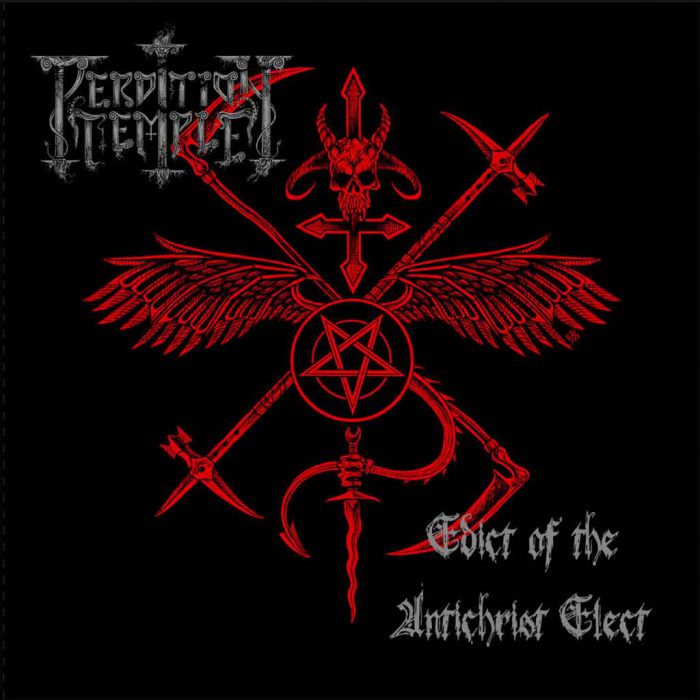War metal like old intensely rhythmic death metal lives within the chromatic scale and only offsets that with bookends of broad leaps in riff, often whole tone scale with a melodic leap in the middle, to interrupt the codex of texture it unleashes to maintain a mood of energy and penetrating beneath surface appearance.
Comparable to bands like Nunslaughter, the war metal machine that is Perdition Temple issues forth about four hundred good riff ideas per album with half of them derived from older death metal bands that refrained from developing them to a focal role. Expect a rushing high-speed onslaught with lots of chromatic charges and little regard for tonal position within the scale; this texture then comments on itself, developing a language that mainstream music cannot speak, which seems to be the goal.
Edict of the Antichrist Select seems in many ways like an album designed for aerobic exercise since it keeps the pace high and never relents, but it demonstrates a certain amount of technical subtlety in its primary weapon, rhythm, albeit buried in lots of riffs that seem to disregard melody and harmony entirely.
Generally, war metal seems like it should be a tap on the sink of life: you turn it on and it flows out with each song basically indistinguishable from one another. Perdition Temple takes a leap further and makes each song develop a rhythmic shape into a concept, so as long as you do not mind a slamming unrelenting chromatic assault, this delivers the sensation of total alienation in a sawing assault.
Tags: perdition temple, War Metal



Hey Brett, what’s a superior translation of the Republic? I have Grube but I’ve heard that is shit.
As far as the album goes: I might listen to it if every classic death metal album was suddenly erased from existence.
The classics of death metal are time-honored, and the weak have been eliminated. I’d stick with those, barring the few additions to the genre over the past thirty years that have had some presence. We are probably talking about at most a dozen bands there.
I like the Grube translation personally; it is in my view the most precise. The Jowett translation that is available everywhere free however is reasonable as well. I tried one newer translation and it was clear that the person had no idea what was going on, so I left it at the bookstore.
I’d say it’s more like 25 years, but yeah, most of the new stuff just doesn’t hold up. Although I did pick up the Blaspherian full length, so I’m looking forward to that. And it looks like Xtreem is reissuing Adramelech’s Psychostasia, so I’ll check that out since I really enjoy Pure Blood Doom.
As to Plato, thanks. I guess I’ll just stick with Grube. I also found translations by Desmond Lee and WHD Rouse, both of whom apparently taught at Cambridge, so I’ll give those a go as well.
In my view, 1994 was the last good year for metal. Some bands that existed prior to that time kept releasing, and much of that was good, but by 1998, it was very hard to find anything new that was worth paying attention to. Sinister Hate may have been one of the last exciting ones. The Blaspherian full-length is quite good however, and full of old school spirit yet with its own mind and personality.
Dol Guldur came out in 97, Slaughtersun and Obscura came out in 98 and Joined in Darkness in 99, as well as Close to a World Below in 2000, all of which are amazing. All of these bands had already released a bunch of material but (arguably with Gorguts and Immolation) these are their best albums. But for the most part you’re right, obviously. I tend to place the end of good metal around 2000 but this is merely semantic given the amount of time that’s passed either way. I’m definitely excited to check out the Blaspherian album, as I really liked “Allegiance” and hopefully they got even better at songwriting.
That’s true, those are some good albums. I see them as the tail end however. Immolation finally got to edit their stuff down to the basics and work out some of the patterns they had been kicking around since their speed metal days as Rigor Mortis. Gorguts imported some talent that worked the twisted riffs into exotic songs. Summoning just finalized the style they began on their second album, nailed the production, and took some time editing out the random that plagues Austrian bands such as Abigor sometimes. Demoncy took a new direction, but this band keeps constantly reinventing itself, even doing quality work in 2009 or whenever the last big one dropped. What you might be seeing in Y2K is the refinement of the genre, the peak before the drop, but that means that most of the momentum was already lost and the rearguard is just summarizing its potential expressed so far. Bleak, perhaps. The Blaspherian full-length and demos CDs are my favorites for whatever reason.